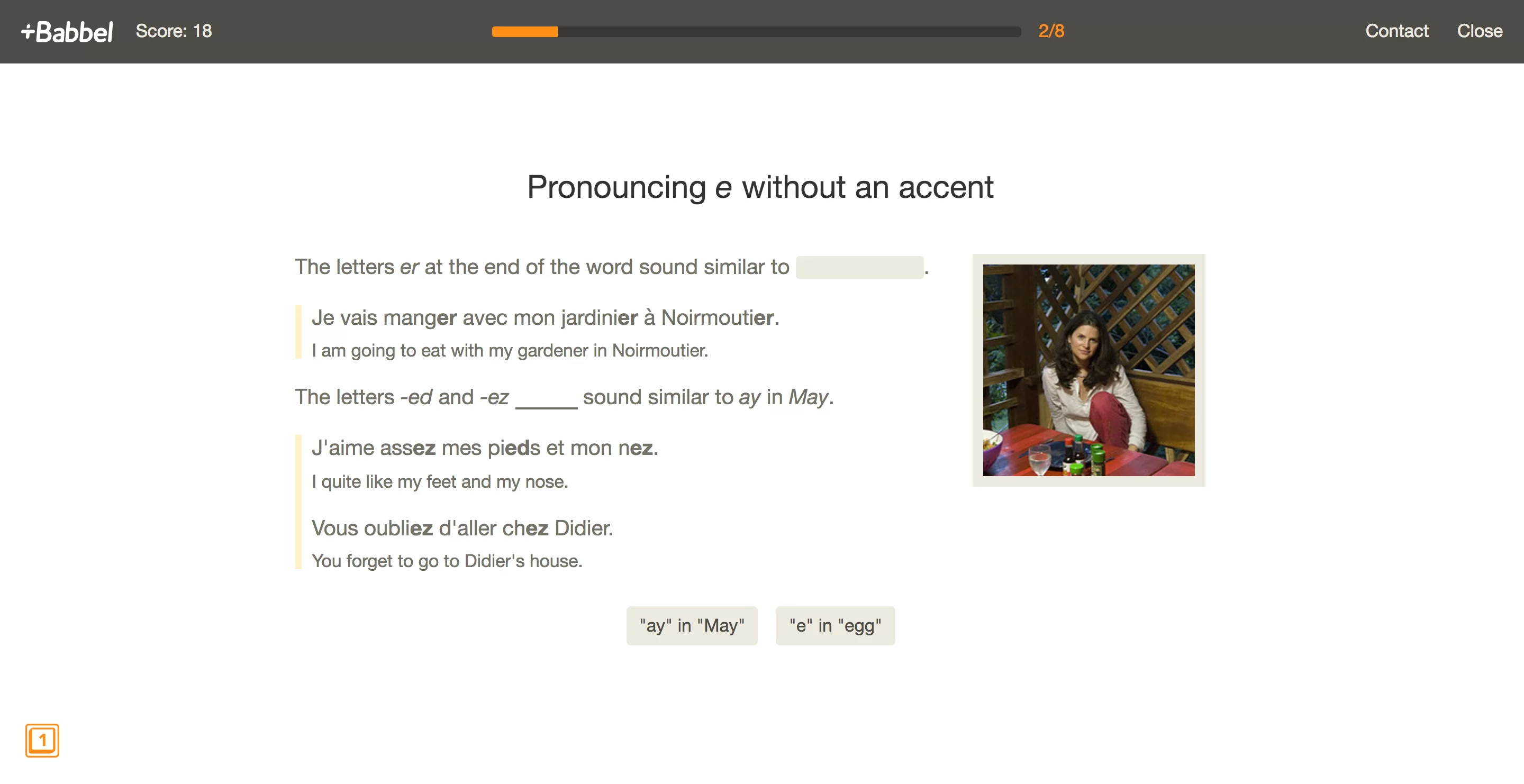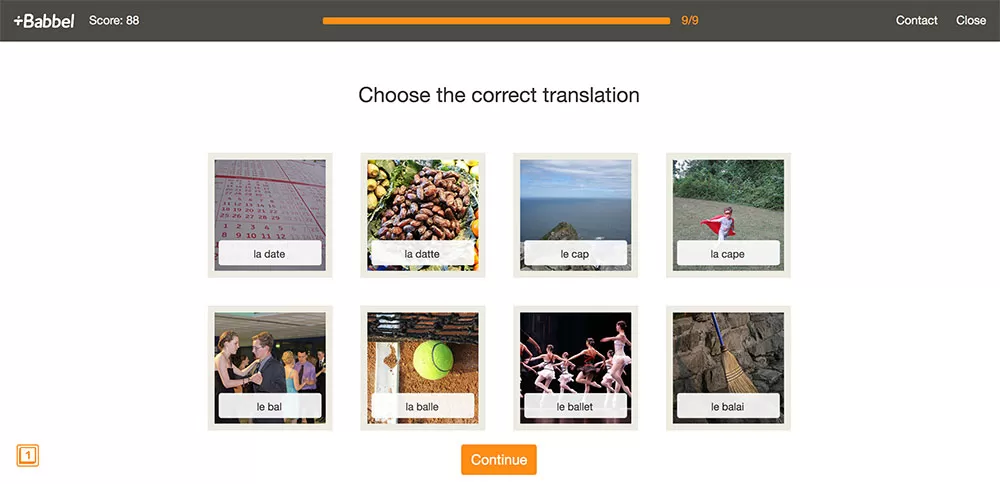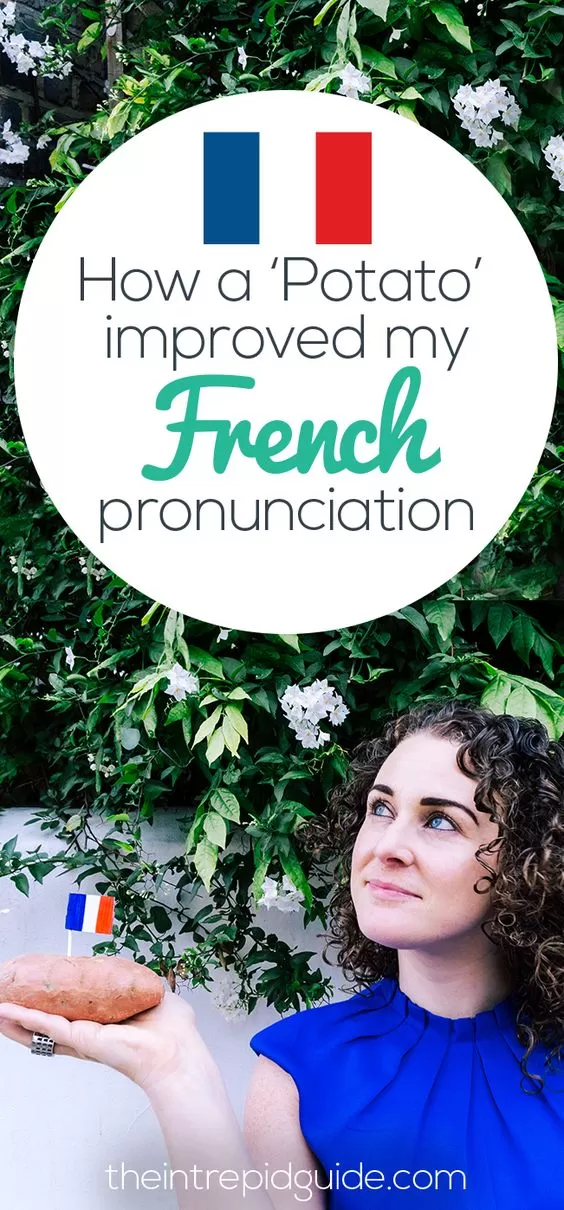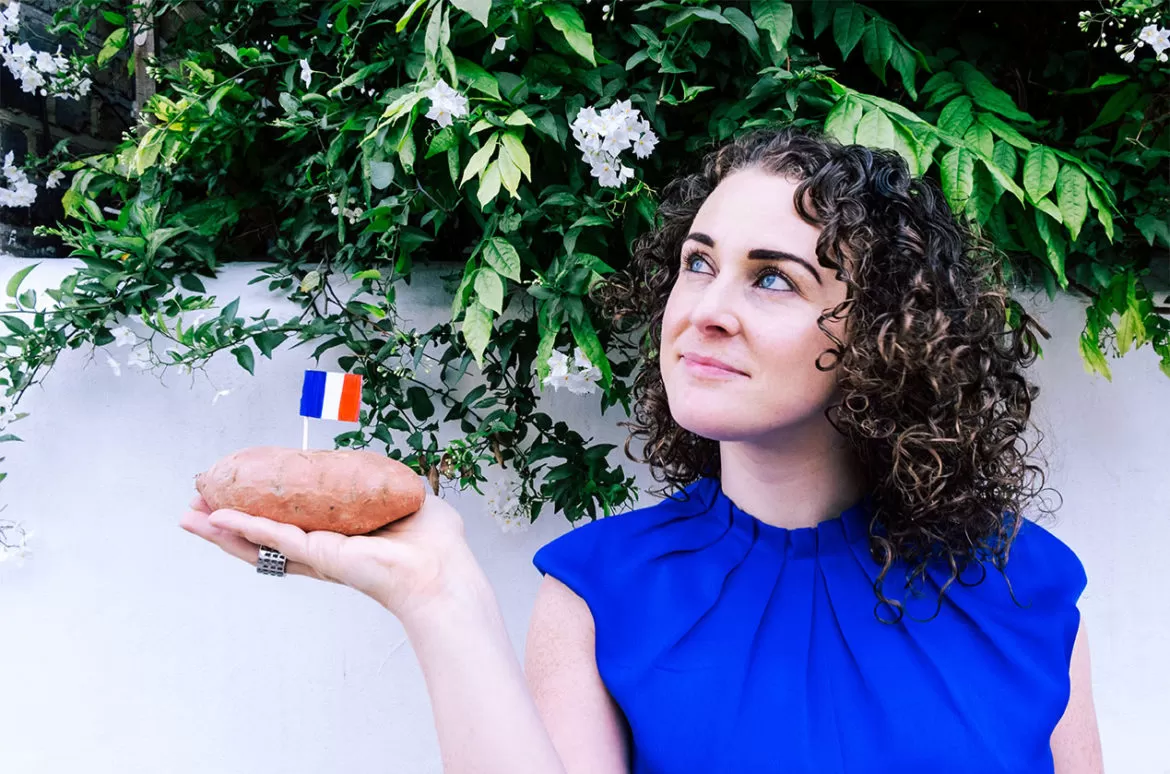Ready to improve your French pronunciation? Get my top tips for conquering those crazy French sounds and start nailing your French accent today.
Why is she putting french fries on my tray?
I try ordering again.
She comes back with a larger portion.
What did I miss?
I asked for a bottle of water and she’s convinced I want french fries?!
The Problem with my French Pronunciation
It’s March 2014 and I’ve been studying French twice a week for less than four months. My friend Asma (also in my French class) and I decided to put our new skills to the test and head to Bordeaux for the weekend.
Asma is less confident with her French so she leaves all the talking up to me. Nervous but excited, I jump at every opportunity to converse in French.
Day one went something like this:
Je voudrais cette baguette, s’il vous plaît. (I would like this baguette, please)
Success! The lady at the bakery understands and hands me my baguette. My confidence levels shoot up. I know exactly how to construct my question and my pronunciation seems to be bang on.
Later on, things get a little trickier. Asma spots a cute pink butterfly-shaped doormat in the window of a home decor store. When we go inside for a closer look we realise it’s damaged, Asma asks me to find out if they have another one.
Challenge accepted!
As I locate the assistant, I think to myself, how am I going to explain this one?
In basic French and I manage to ask:
Il y una papillon par terre, est-ce qu’il y a un autre?
To French ears I’m saying, “there is a butterfly on the floor, is there another one?”.
At this point I’m expecting the assistant to burst out laughing instead, she looks at me, puzzled. But as soon as I repeat papillon par terre (butterfly on the floor), she grins and knows exactly what I’m referring “ah oui! le tapis?” (ah yes! the rug?)
Word of the day: tapis, ‘rug’. I won’t forget that word in a hurry.
At this point, I’m feeling even more confident. Even with my limited vocabulary, I’m still being correctly understood.
In my head, my French pronunciation is infallible. All I need to do is focus more on learning vocabulary.
Day two. Sunday. It’s our last day and the shops close much earlier than we expect. I’m thirsty, and we haven’t eaten yet. The only place open is McDonald’s, or as the French call it “MacDoh”.
“It’s France, I can’t go to McDonald’s!”
My internal struggle doesn’t last long when I realise we have no other choice.
Overwhelmed by the massive specials board, I slide up to the counter and order a bottle of water, une bouteille d’eau, s’il vous plaît”. Which sounds something like oon boo-tay-yeh doh, seel voo pleh.
I repeat my order three times, only to be met with various sized portions of French Fries. It seems like she understands me yet something is definitely amiss. Is it my accent? What could she possibly think I’m saying?
Do me a favour and repeat this aloud oon boo-tay-yeh doh. What does it sound like?
Apparently, it should sound like this:
In a thick French accent, the server responds in English. “Oh, I thought you were asking for a ‘potato’ not une bouteille d’eau”.?
Wow! I wasn’t expecting that.
Pronunciation lesson 101, enunciate! I must’ve said une bouteille d’eau so fast that she thought I was speaking English!
This brief encounter made me realise how important pronunciation is and how it can influence being correctly understood.
After this brief encounter, I started to consciously enunciate when I spoke. Not only that, but I started to pay more attention in differentiating the sounds between all those crazy French-accented vowels.
At least I’m not the only one to have trouble with pronunciation.
Introducing Homophones
Nailing your French pronunciation is hard enough without the additional stress of these so-called homophones.
Homophones are words that sound alike but have different meanings. In English, we have loads of them like “knew” and “new,” “their” and “they’re,” and “guerrilla” and “gorilla.”
Somehow, I managed to create a new homophone mixing two languages!
In French, there are plenty of homophones. For example:
Au/aux/eau
au – means ‘at the’ or ‘to the’ is the contraction of à and le (masculine singular indefinite article)
aux – means ‘at the’ or ‘to the’ is the contraction of à and les (plural indefinite article)
eau – means ‘water’
While these three words are pronounced the same, only one of these homophones will make sense when you ask for une bouteille d’eau.
We have the same problem with the following words which have the same pronunciation yet have different spelling and meaning.
Moi and mois – ‘me’ and ‘month’
Soi and soie – ‘self’ and ‘silk’
Pois and poids – ‘peas’ and ‘weight’
Then there’s
amande/amende
une amande — an almond
une amende — a fine
It can be difficult telling these apart when spoken since they’re both feminine. It’s much easier seeing them written down thanks to the vowel differences.
Just be careful you don’t say, J’ai reçu une amande pour avoir conduit trop vite (I received an almond for driving too fast). Even as I write this Google Docs knows I’ve used the wrong word.
The Case of Confusing Minimals Pairs
Another one which always trips me up is, dessus and dessous. Because there is one phonological element which is different, this called a ‘minimal pair’.
Dessus means on or on top of whilst the opposite is dessous meaning under, beneath, or below
There is very little distinction in the pronunciation between these words, you just have to listen really carefully.
Listen to the subtle differences between Dessus and Dessous
How to Improve your French accent and pronunciation
So, how do we avoid embarrassing situations like this?
My top tip for avoiding confusing homophones is to pay attention to the context of the phrase. Eventually, you’ll be able to notice the difference in the pronunciation of these words if you practice and listen enough to the language.
An excellent method in practising your French and overcoming the problem of comprehension and vocabulary is to take Babbel pronunciation and sound twins courses.
If you’re not familiar with Babbel, it’s is a subscription-based web and mobile app that you can use to learn up to fourteen different languages.
What I really like about Babbel is that no matter which aspect of the language you’re struggling with Babbel has a course that focuses on helping you improve it.
For me, it’s pronunciation. So it’s awesome to see that they have a dedicated course to pronouncing the accented vowels like e, é, è, ê and ë.

Even homophones are covered! Babbel has an excellent series of audio-comparative exercises where you can both see and hear the words in context. And to make sure you’ve nailed the pronunciation, just turn on the speech recognition feature.

Whether you want to focus on improving your writing or brush up on travel vocabulary, Babbel has a course for it no matter whichever level you’re at.
It’s also reassuring to know that all courses are designed by professional linguists who adapt lessons to your native tongue.
If you’re serious about learning languages, I recommend giving Babbel a try. They offer a free demo course so you can sign up today and see for yourself. As a reader of my blog, Babbel will give you an additional 6 months FREE when you sign up for 6 months. Limited time only! Visit Babbel’s website for more details.
Have a play around with their user-friendly interface and browse through their extensive collection of courses, each designed to help you nail your French (and 13 other languages).
My personal favourite is their idioms courses, but that’s just mon grain de sel (my two cents worth.)
Many thanks to Babbel for providing me with a complimentary account. They did not request a favourable review, and all opinions here are, as always, my own.
Don’t miss these French posts
- Top 10 Phrases to Never Say in French [Cheat-Sheet]
- Survival French Travel Phrase Guide with Pronunciation
- 25 Funny French Idioms Translated Literally
- 10 French Phrases the French Love Saying Revealed!
- 22 Most Common French Grammar Mistakes [& How to Avoid Them]
Want to know more about learning languages? Start here!
- How to Learn Languages Like Crazy, Even If You Have a Crazy Life [3-Step Method]
- Essential Travel Phrases: How to be Travel Fluent in 10 Simple Steps
- 44 Best Movies on Disney Plus for Learning Languages
- What Type of Language Learner Are You? Your 4-Step Personalised Learning Plan
- 10 Pro Tips: How to Learn a Language with a Full-Time Job
- How to Learn Your First Foreign Language in 8 Simple Steps: A Beginner’s Guide
- 7 Reasons Why You Should Go on a Language Holiday
- 20 Top Language Learning Resources You Should Use
- 13 Ways to Seamlessly Integrate Language Learning into Your Daily Life
- 23 Cool Gift for Language Learners They Will Actually Use and Love
- 11 Life-Changing Reasons Why You Should Learn a Language
- 42 beautiful Inspirational Quotes for Language Learners
- Language learning tips: 11 Polyglots Reveal The Secrets of Their Success
- How to Learn Italian Before Your Trip
- How to Master Common Italian Phrases for Travel (Like a Local!)
- Mondly Review: 10 Ways Mondly Drastically Improved My Language Learning
- How a ‘Potato’ improved my French Pronunciation
- How Many Languages are there in the World?
Like it? Pin it for later!

Over to you!
Are you learning French? What do you find the most difficult?
Let me know using the comments section below or join me on social media to start a conversation.
Thanks for reading and I hope you enjoyed this post.
Like what you see? Subscribe using the form below to have all of my posts delivered directly to your email.


14 comments
The potato-thing happened to me in Paris last year. And no-less, it happened at the McDonalds on la rue Champs-Elysees when I went in to buy deux bouteille d’eau (or two potates as it were). The cashier (who btw, was way to old to be working the McDonalds counter) screams POTATOE? loud enough for the entire ‘restaurant’ to hear. I was furious and mortified in equal measures and convinced that she did it on purpose. I’m heading back to Paris in September. This time I will be asking for <>. Nice – and – slow.
haha thanks for sharing your experience Dylan. It’s so funny that we had such a similar experience and in no less, Mc Donalds of all places! :) I hope you have a wonderful trip back to Paris :)
The joys of learning a language! A brilliant, refreshingly written article Michele. I’ll be sure to check out the Babbel app.
Thanks Mark, good luck with your journey to fluency :)
Hi Michele,
Wow, I have to say, this is a very well written article and at the same time it was very fun to digest. I love the idea of how your real life story explained how pronunciation is important in learning any language. Important message, I will always remember is “annunciate!”. I also enjoyed the introduction to “Homophones”. Imagine an incorrect pronunciation of “beaucoup/beau cul” can lead to getting weird looks!! :-) And thanks for providing examples and audio/video links right in the same article. So much helpful. Language learning is a difficult process in general and articles like this definitely help to alleviate confusion and broaden the learning process. A great tip on learning with context. I have used Babel before and it is a great app for learning a language. And I just found out they have Norwegian now which I couldn’t find anywhere else. So I might take that limited time offer to learn Norwegian!! Cheers and keep the good work!
Hi again, I just re-read my comment and I wanted to add something. Moi/mois, soi/soie are homophones, as you brought out. But in the case of “dessous/dessus” and “pas/bas” those are minimal pairs, where one sound differentiates them. I forget if that has a name in French, but is definitely a good tip to have!
Well spotted Euletha. I’ve added in an edit to clarify this :)
Hi Michele! I love this post, because I can definitely relate to this, too! And of course, those embarrassing moments when you learn through your mistakes do give a good story to tell!
I love your pronunciation tips. (I’ve been speaking French for over a decade and dessous and dessus still trip me up all the time, too!) Homophones are tricky, but I think your tip about listening to context is essential! I also think an awareness of individual sounds and how they are produced is helpful, too, which is why I love pronunciation videos that show closeups of people talking.
I’m going to check out that Babbel program, too. Being the language nut that I am, and based on your amazing review of it, I can see myself turning into a polyglot in no time. :)
Hi Euletha, thank you for such a lovely comment and feedback. Yes, pronunciation videos or audio clips are great especially when you’re able to slow them down and can hear each sound. Sometimes I play them on loop just to make sure I’ve nailed it before moving on :)
Good luck with Babbel. I’m sure you’ll love it. Let me know how you get on with it ?
I think getting your accent and pronunciation right is the number one hindrance or help to being able to communicate effectively in the other language. It doesn’t always help if there’s a slightly different colloquial pronunciation, but if you manage to get the standard one correct, they might have a better chance. When I was learning French, we were encouraged to practise speaking it as often as possible, as that helps you improve. I think watching films or programmes with English subtitles on can help with better pronunciation too.
Hi Emily, I think your comment on speaking as often as possible is spot on. It’s very powerful in retaining learnt material as because your brain remembers you saying it. The brain is able to recall it better when its knows how it sounds with your voice more so than your teacher’s. Watching films with subtitles both in English or a foreign language is a personal favourite :) Best of luck with your continued language studies :)
What an informative post, thank you for the great lesson on homophones. I feel inspired to learn more French ?
Hey Michele
What a great story haha??. I’m actually busy learning Portuguese so will definitely check out Babbel to help in my learning.
Keep up the good work.
Thanks Basil. It was so funny and embarrassing at the time. I felt terrible because the server was convinced I was saying ‘potato’ even when I ordered everything else in French! haha